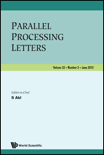
NEURAL PROCESSING LETTERS
metrics 2024
Exploring the Synergy of Neural Networks and Computing.
Introduction
NEURAL PROCESSING LETTERS, published by Springer, is a prestigious journal dedicated to the interdisciplinary fields of Artificial Intelligence, Computer Networks and Communications, Software Engineering, and Neuroscience. Established in 1994, the journal has built a solid reputation over the past decades, showcasing innovative research and developments that significantly contribute to the advancement of these dynamic areas. With a 2023 Scopus quartile ranking of Q2 in Artificial Intelligence and Computer Networks and Communications, and a Q3 ranking in Neuroscience, this journal occupies an important niche for professionals and researchers alike. The journal’s impact is further evidenced by its competitive Scopus ranks, positioning it within the top 60th percentile across its categories. Researchers looking for a platform to disseminate their findings in the intersection of technology and neuroscience will find NEURAL PROCESSING LETTERS an invaluable resource. For additional engagement and visibility, the journal supports various access options; however, it's important to note that it does not currently operate under an open access model. For submissions or queries, the journal can be reached at its headquarters in Dordrecht, Netherlands.
Metrics 2024
 0.69
0.69 2.60
2.60 2.40
2.40 65
65Metrics History
Rank 2024
Scopus
IF (Web Of Science)
JCI (Web Of Science)
Quartile History
Similar Journals

Frontiers in Computational Neuroscience
Innovating the Future of Neuroscience with Computational Precision.Frontiers in Computational Neuroscience, published by FRONTIERS MEDIA SA, is a leading journal within the fields of neuroscience and computational biology, dedicated to advancing the understanding of the brain's complex functions through innovative computational methodologies. Since its establishment in 2007, this Open Access journal has provided a platform for researchers around the globe to share their groundbreaking findings, as evidenced by its continual presence in the academic conversation and a strong ranking within Scopus metrics (Rank #12/49 in Neuroscience - Neuroscience (miscellaneous) and Rank #63/97 in Cellular and Molecular Neuroscience). With an esteemed impact factor reflective of its quality and influence, and a commitment to providing freely accessible research, this journal plays a crucial role in fostering collaboration and knowledge dissemination among professionals, researchers, and students alike. Located in the scientific hub of Switzerland, it invites submissions from diverse perspectives, aiming to bridge the gap between computational models and biological insights through rigorous peer-reviewed publications.

Parallel Processing Letters
Advancing the Frontiers of Parallel Processing.Parallel Processing Letters is a notable academic journal published by World Scientific Publishing Co Pte Ltd, focusing on the dynamic fields of Computer Science, particularly in Hardware and Architecture, Software, and Theoretical Computer Science. Established in 1994, this journal provides a platform for the dissemination of cutting-edge research and developments in parallel processing and computational technologies. Despite its current Q4 ranking in multiple categories, Parallel Processing Letters plays an important role in fostering scholarly discussion and innovation within the computing community. With the ISSN 0129-6264 and E-ISSN 1793-642X, the journal is dedicated to maintaining rigorous academic standards while encouraging collaborative research conducive to the advancement of parallel processing systems. It serves as a valuable resource for researchers, professionals, and students seeking to deepen their understanding and gain insights into this rapidly evolving domain.

OPTICAL MEMORY AND NEURAL NETWORKS
Pioneering Innovations in Optical Memory and Neural NetworksOPTICAL MEMORY AND NEURAL NETWORKS is a premier academic journal dedicated to advancing the fields of optical memory technologies and neural network applications. Published by SpringerNature in the United States, this interdisciplinary journal serves as an essential platform for researchers and professionals to disseminate findings and insights that bridge the gap between computer science, electrical engineering, and materials science. With an ISSN of 1060-992X and an E-ISSN of 1934-7898, it encompasses a wide range of innovative topics across its scope, which includes but is not limited to optical storage methods, neural network modelling, and the interaction of light with electronic materials. Though currently categorized in the Q4 tier across multiple relevant disciplines—such as computer science and electrical engineering—its commitment to quality research aims to enhance its standing in the academic community by 2024. Through rigorous peer review and an emphasis on novel contributions, this journal not only encourages exploration and development in emerging areas of technology but also seeks to support the educational needs of students and practitioners alike, fostering a collaborative environment for scientific advancement.

PROGRAMMING AND COMPUTER SOFTWARE
Connecting Researchers and Practitioners in Software DevelopmentPROGRAMMING AND COMPUTER SOFTWARE is a distinguished journal committed to advancing the field of software development and programming methodologies. Published by PLEIADES PUBLISHING INC, this journal has been a valuable resource since its inception in 1978, reaching out to researchers, professionals, and students alike. With an emphasis on rigorous peer-reviewed articles, the journal holds a Q3 ranking in the realm of Software according to the latest 2023 Category Quartiles. Though it does not offer open access, the journal ensures that high-quality research is disseminated to its audience, providing insights into evolving programming techniques, software engineering challenges, and innovative solutions. With its convergence of years extending to 2024, PROGRAMMING AND COMPUTER SOFTWARE remains a pivotal publication, fostering a deeper understanding of the complexities in computer programming while supporting the broader software community.

Open Computer Science
Unlocking the potential of computer science for everyone.Open Computer Science is a premier scholarly journal published by DE GRUYTER POLAND SP Z O O, dedicated to fostering innovative research and discussions in the rapidly evolving field of computer science. With an impact factor that places it in Q2 of the computer science (miscellaneous) category, as well as a commendable Scopus ranking of #80 out of 232 and a 65th percentile standing, this journal serves as a critical resource for researchers, professionals, and students alike. Since its inception in 2011 and having embraced the open access model, Open Computer Science promotes the dissemination of knowledge across a global audience, ensuring that cutting-edge research is accessible to all. By covering a broad range of topics within the realm of computer science, this journal is committed to advancing the discipline’s theoretical and practical boundaries. The journal is published in Germany and features robust editorial standards, ensuring the inclusion of high-quality, peer-reviewed articles that contribute significantly to the field.

PROCEEDINGS OF THE IEEE
Empowering Scholars with Premier Research InsightsPROCEEDINGS OF THE IEEE, published by the IEEE-Institute of Electrical and Electronics Engineers Inc, stands as a premier journal within the fields of Computer Science and Electrical and Electronic Engineering. Since its inception in 1963, it has provided a platform for cutting-edge research and developments, showcasing innovative studies and breakthrough technologies that influence academia and industry alike. With an impressive Q1 ranking in both fields according to the latest quartiles, this journal ranks among the top in its categories, holding a prestigious spot in the Scopus metrics—ranking 1st in General Computer Science and 4th in Electrical and Electronic Engineering. Researchers, professionals, and students benefit from its comprehensive scope that includes a wide range of topics from algorithms and computing systems to circuit design and network technologies. Additionally, though not available as an open-access publication, its significant impact factor signifies its role in advancing scholarly dialogue and innovation in these fast-evolving fields. With contributions from leading experts and a commitment to high-quality research, the PROCEEDINGS OF THE IEEE continues to be an essential resource for anyone invested in technological progress and scientific inquiry.

Foundations of Data Science
Transforming Data into DiscoveriesFoundations of Data Science, published by the American Institute of Mathematical Sciences (AIMS), is a pioneering journal dedicated to advancing knowledge within the ever-evolving fields of data science, mathematics, and computational theory. With an impact factor reflecting its quality and relevance, this journal has established itself as a crucial resource for researchers and professionals alike, achieving remarkable rankings in the Scopus metrics across various mathematical categories, including 35th in Analysis and 70th in Statistics and Probability. The journal, which has been continuously growing in significance since its inception in 2019, focuses on both foundational theories and applied methodologies, providing open access to cutting-edge research from 2024 onward. Its commitment to fostering interdisciplinary collaboration ensures that it remains at the forefront of the data science realm, making it an essential platform for students, scholars, and practitioners aiming to deepen their understanding and contribute to the scientific community.

Machine Intelligence Research
Connecting Global Minds in AI ResearchMachine Intelligence Research is a premier academic journal published by SPRINGERNATURE, dedicated to advancing knowledge in the rapidly evolving fields of Artificial Intelligence, Applied Mathematics, and more. With its ISSN 2731-538X and E-ISSN 2731-5398, the journal is recognized for its impact, holding a distinguished position in various Q1 categories for 2023, including Computer Vision and Pattern Recognition and Control and Systems Engineering. Operating under an Open Access model, it ensures that groundbreaking research from China and around the world remains accessible to a global audience, promoting collaboration and innovation. As a beacon for researchers, professionals, and students, Machine Intelligence Research aims to disseminate high-quality research findings, innovative methodologies, and influential theories, thereby shaping the future landscapes of science and technology.

IEEE Computational Intelligence Magazine
Connecting Scholars and Practitioners in Computational IntelligenceIEEE Computational Intelligence Magazine, published by the esteemed IEEE-INST ELECTRICAL ELECTRONICS ENGINEERS INC, is an essential resource for researchers and professionals in the fields of Artificial Intelligence and Theoretical Computer Science. With a robust Q1 ranking in both categories for 2023, this magazine stands out as a leader in disseminating cutting-edge research and innovative applications within computational intelligence. As an invaluable conduit for knowledge, it covers a diverse range of topics, including but not limited to machine learning, neural networks, and data mining. The magazine is particularly recognized for its interdisciplinary approach, bridging gaps between theory and application while contributing to advancements in technology and society. Although it does not offer open access, the insights provided are critical for staying at the forefront of this rapidly evolving discipline. Join a community of like-minded scholars and practitioners by exploring the latest findings and trends published from 2006 to 2024, operating from its headquarters at 445 Hoes Lane, Piscataway, NJ, United States.

Cognitive Computation and Systems
Bridging Cognitive Science and Computational Excellence.Cognitive Computation and Systems is an innovative open-access journal published by Wiley, dedicated to advancing the fields of Artificial Intelligence, Cognitive Neuroscience, and Computer Science Applications. Based in the United Kingdom, this journal has established itself as a key resource for researchers, students, and professionals alike since its inception in 2019. With a focus on the convergence of cognitive theories and computational methodologies, Cognitive Computation and Systems aims to publish high-quality research that bridges holistic cognitive processing with algorithmic design. Although the journal is currently categorized in the lower quartiles of its fields, it provides a unique platform for disseminating pioneering ideas that can drive the vital intersection of computer vision, pattern recognition, and psychology. Scholars can take advantage of its open-access model, ensuring that research findings are freely available, thus promoting wider knowledge sharing and collaboration within these rapidly evolving domains. With its ambitious scope and commitment to quality, this journal is poised to make a significant impact in its respective fields.